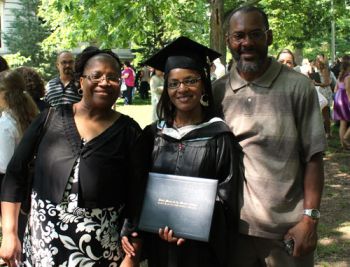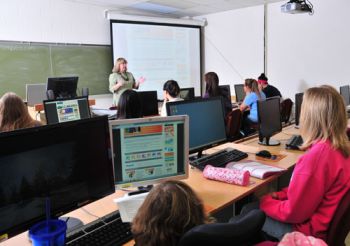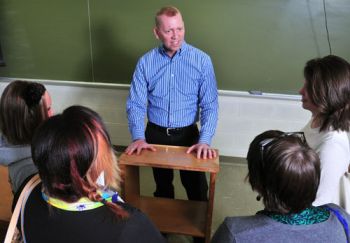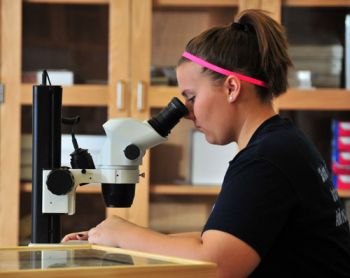
SMWC campus and online students have many opportunities to create a résumé brimming with professional experience before graduation.
What does it mean to have a college degree? Back in the mid-20th century, it meant a better future, more money and security. A college degree was the cherry on top of the American dream. However, to current and potential college students, a degree nowadays doesn’t always come with that guarantee. To some, a degree means more competition, peppered with the fear of not finding a job and steadily rising debt.
The landscape of higher education is changing. With a new grant from the Lumina Foundation, Saint Mary-of-the-Woods College (SMWC) is pioneering part of that change. “People value what we are doing here at The Woods,” said Janet Clark, Ph.D., SMWC’s vice president for academic affairs. “Based on our successful accreditation history, the Higher Learning Commission (HLC) invited SMWC to test Lumina’s Degree Qualifications Profile (DQP). Our findings will be part of a national conversation about higher education, which will help define what it means to have a post-secondary degree.”
At first glance, the DQP looks a lot like a spider web. Entangled together are skills all graduates should have, and all colleges and universities should teach – applied learning, civic learning, intellectual skills, integrative knowledge and specialized knowledge.

SMWC prepares students for diverse careers by giving them room to explore different theories and techniques with cutting-edge technology.
“Right now, we have no common definition of what a degree means in the United States,” said Marcus Kolb, program officer at Lumina, a private Indianapolis foundation committed to increasing access and success in post-secondary education. “That can create issues with quality. The DQP’s overarching goal is to create a better definition, a shared definition, of what skills a graduate should have.”
When the HLC, the accrediting body for degree-granting post-secondary educational institutions in the North Central Association, began considering a new accrediting model, they turned to the DQP and to SMWC. “SMWC will provide evaluation and commentary on the DQP and identify ways to improve the programs being reviewed,” said John Hausaman, HLC’s process administrator for public information in Chicago, Ill. “They will also identify whether the DQP can play an ongoing role in the accreditation process.”
The Woods is the only higher education institution in the Wabash Valley and one of only three in the entire state invited by the commission to test the DQP. “We let the HLC choose who would test the DQP,” Kolb explained, “because we want to get it on campuses and get feedback from valued faculty.”

SMWC professors employ an unparalleled student-centered approach.
SMWC’s DQP analysis will launch the value of a degree into the 21st century. “Students have to be prepared for jobs that are global, complex and rapidly changing,” Clark said. “With that in mind, we decided to test the DQP by using its learning outcomes as the student learning outcomes being formulated in our new general studies curriculum which is under development and due to be implemented in the fall of 2013.”
A standard of 39 hours that all SMWC students must pass, general studies is the heart of the College’s liberal arts core. Focusing on critical thinking, global perspectives and lifelong learning, most of SMWC’s outcomes were already in the DQP. “This is an affirmation that liberal arts colleges (and SMWC in particular) already impart the intellectual skills and aptitudes that many people think a college student should graduate knowing,” Clark said. “We’re using the DQP as a framework to develop a curriculum that put outcomes first, using common language that clearly defines expectations to students and the public.”
So, in one part, the DQP strives to assess the quality of a degree, creating a unified definition that students, institutions and employers can clearly grasp. For example, when a graduate with a bachelor’s in biology applies for a job, the potential employer can expect an applicant with their education to integrate broad skills, like real-world problem solving, with specialized knowledge, such as how to culture cells in a lab.

Students at women’s colleges are more likely earn graduate degrees in science and stay on those career paths than students at co-educational institutions.
In a subtler but no less important way, the DQP also gives the public a clear view of exactly how higher education contributes to the public good. Debt, unemployment, rising tuition – the national chatter about higher education is sometimes undeniably grim. The public’s trust in higher education is waning. They need to not only be told why a college degree is important; they need to be shown.
“We have to prove why we’re worth the bottom line,” said Mike Aycock, assistant professor of English and member of SMWC’s general studies revision committee. “The DQP tries to help the public understand the specific outcomes we accomplish. It creates more confidence in what a degree can do.”
The DQP doesn’t seek to set standards or limit academic freedom. Rather, it proposes a set of commonly agreed upon values that enhance the quality and integrity of post-secondary degrees.
“The DQP focuses more on the outcomes, but it’s up to the faculty and institutions to determine how to get the students there,” Kolb said. “We’re grateful to SMWC for taking on this challenge. Their faculty has such spirit and a can-do attitude. They really want to make good things happen for their students.”
Follow media coverage of this story:
- Woods research to help define what having a degree means, Terre Haute Tribune Star, August 2012
